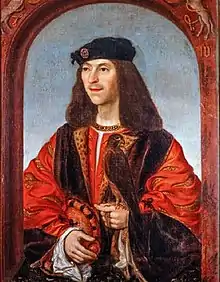Margaret Dennet
Margaret Dennet was an English servant of Margaret Tudor, the wife of James IV of Scotland, and the owner of lands near Inverness.
Margaret Dennet was one of Margaret Tudor's English servants, a chamberer. The queen was allowed 24 English servants by her marriage contract. As a New Year's Day gift in January 1504, she was a given a gold chain with a figure of St Andrew. This was a welcoming gift to Scotland.[1] At £20 Scots, the gift was more expensive than those received by other women.[2]
She married Sir Alexander Ogilvy of Far and Cullard one of the king's squires.[3] After her marriage, in October 1507 she was given lands in her husband's barony of Cardale including Holm just south of Inverness.[4]
Margaret Dennet seems to have remained at court and was given satin for a gown in January 1508 when other courtiers including Elizabeth Berlay were given clothes.[5] In January 1509 she was granted an income from fishing rights on the River Spey.[6]
James Ogilvy of Cardell had a charter for the same lands near Inverness with the castle mound and castle at Brodland or Bordland in 1535, presumably after the death of Margaret Dennet. The lands included Borlum or Ness Castle, now part of Inverness.[7] James Ogilvy was a son of Alexander Ogilvy of Findlater and Deskford, and Jonet Abernethy, a daughter of Lord Saltoun.[8]
References
- Michelle Beer, Queenship at the Renaissance Courts of Britain: Catherine of Aragon and Margaret Tudor (Woodbridge, 2018), p. 107: Accounts of the Treasurer, vol. 2 (Edinburgh, 1900), p. 472.
- James Balfour Paul, Accounts of the Treasurer, vol. 2 (Edinburgh, 1900), p. 412.
- Michelle Beer, Queenship at the Renaissance Courts of Britain: Catherine of Aragon and Margaret Tudor (Woodbridge, 2018), p. 108.
- M. Livingstone, Register of the Privy Seal of Scotland, vol. 1 (Edinburgh, 1908), pp. 226 no. 1563.
- Accounts of the Treasurer, vol. 4 (Edinburgh, 1902), p. 60.
- M. Livingstone, Register of the Privy Seal of Scotland, vol. 1 (Edinburgh, 1908), pp. 274-4 no. 1803.
- Register of the Great Seal of Scotland, 1513-1546 (Edinburgh, 1883), p. 320 no. 1448.
- James Balfour Paul, Scots Peerage, vol. 4 (Edinburgh, 1904), p. 22.
